General
Makerere honours late Dr. Joshua Baitwa Mugyenyi
Published
14 years agoon
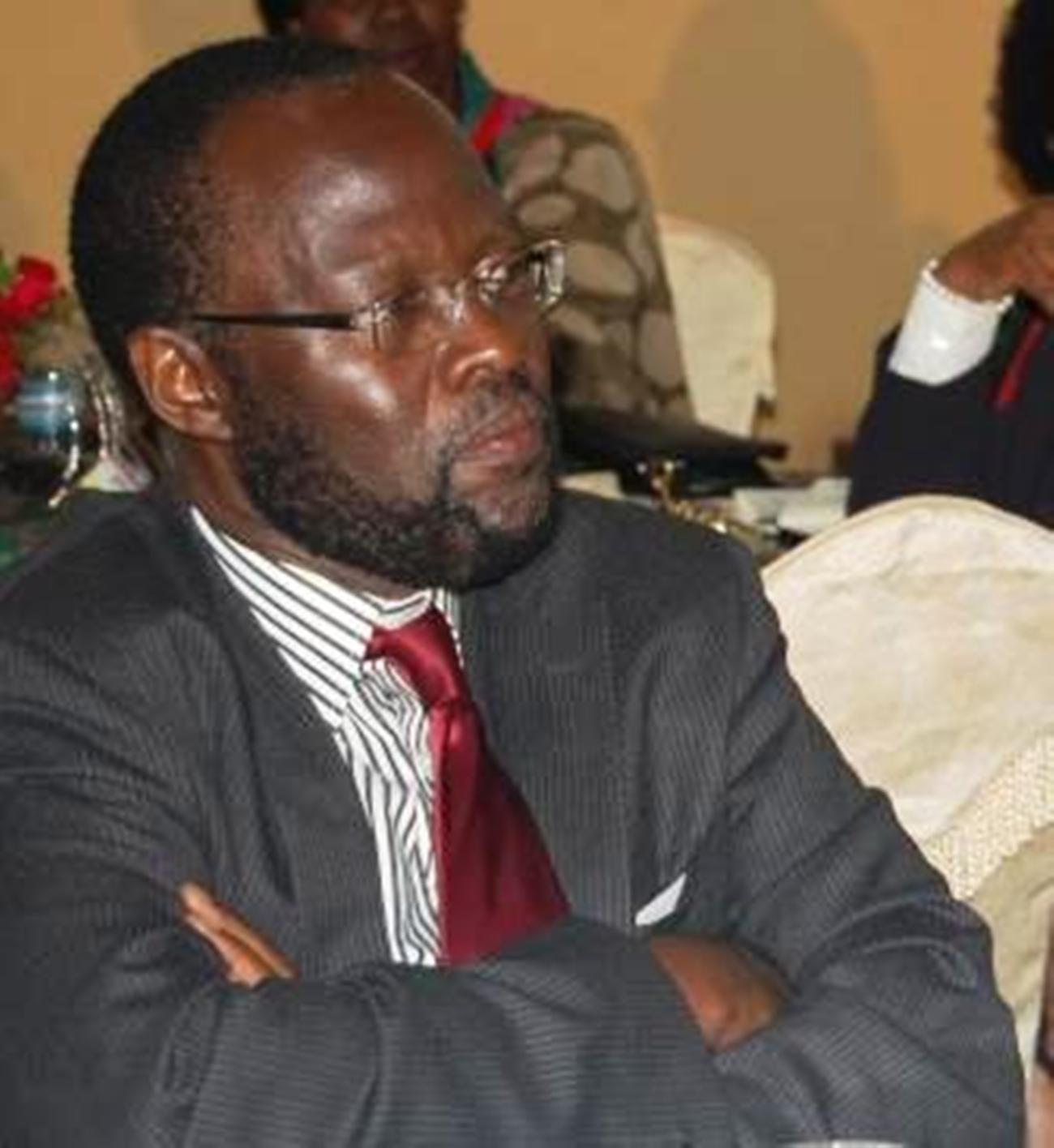
It was befitting to dedicate the fourth lecture in the Makerere Africa Lecture Series to celebrating the life of Dr. Joshua Baitwa Mugyenyi, a brilliant student, distinguished alumnus, member of faculty and who while still a student at Makerere in 1970, was a part of the group that conceived the idea of having the Africa Lecture Series at the campus.
The fourth lecture in the Makerere Africa Lecture Series, was held on 15th March 2012 marking exactly ten years since Joshua passed on. The lecture focused on paying tribute to the strong values that the late Joshua Baitwa Mugyenyi stood for. This witnessed the launch of the Dr. Joshua B. Mugyenyi Social Transformation Foundation and the promotion of the Makerere University Female Scholarship Foundation.
Professor Peter Anyang’ Nyong’o, the Minister of Medical Services in the Republic of Kenya and also former Guild President of the Makerere University, gave the key note address.
“Let the spear of intellectual clarity burn wherever he is resting; let this foundation established in his memory spearhead excellence among students who will benefit from it; let the African people be liberated from political oppression and economic exploitation through the energies of the people as Joshua Baitwa Mugyenyi would have wanted it,” he said in his speech.
Born on 27th May 1947 in Kajara County in Ankole Kingdom, Dr. Joshua Baitwa Mugyenyi died on 15th March 2002, but his legacy is still lives on in the lives of individuals he worked with, associated with as well as those he mentored.
The Acting Vice Chancellor of Makerere University, Professor Venansius Baryamureeba welcomed the Guest of Honour, Rt. Hon. Professor Apolo R. Nsibambi, a distinguished alumnus, and Former Chancellor of Makerere University to the public lecture and thanked him for graciously accepting to launch the Dr. Joshua Baitwa Mugyenyi Social Transformation Foundation.
Professor Baryamureeba informed the congregation that Makerere University together with the family and friends, do remember Dr. Joshua Baitwa Mugyenyi as a selfless individual, who gave his best at all times. “We chose this day, 15th March 2012 to remember a brilliant student, distinguished alumnus, former member of faculty and to commemorate a lifetime of achievements of a man who was brutally frank, stood for only the truth, and who fought for the rights of others even at the expense of risking his own life,” remarked Professor Venansius Baryamureeba.
“On this 15th day of March 2012, we join the nation in celebrating the life of an ever optimistic and passionate leader-transformer and eloquent discussant of the socio-economic transformation of Uganda and Africa,” he added.
Joshua Baitwa Mugyenyi joined Makerere University in June 1968 and graduated in 1971 with a Bachelor of Arts in Political Science and Public Administration. While at Makerere, Joshua Baitwa Mugyenyi excelled in academics, he served as Vice President of the Students’ Guild who actively participated in fighting against all forms of injustices and threats to students’ welfare.
Through his teaching career, Josh, as he was fondly known, passionately shared his knowledge at the national and international levels. He was a Senior Lecturer at his alma mater, Makerere, in addition to teaching in other universities in Swaziland and Canada. Mugyenyi co-authored a number of books and published several peer reviewed papers in prominent journals. At the time of his death on 15th March 2002, he was a proactive member of the Makerere University Council-the top policy making organ and Chairperson of the Convocation. He mentored many and significantly contributed to the university motto: We Build for the Future.
In honour of the late Joshua Baitwa Mugyenyi, the Ag. Vice Chancellor of Makerere University, Professor Venansius Baryamureeba welcomed an exceptionally accomplished alumnus and former Guild President, and now Minister of Medical services in the Republic of Kenya, Professor Peter Anyang’ Nyong’o to deliver a public lecture on “Social Transformation in Contemporary Africa: Reminiscences of Dr. Joshua B. Mugyenyi.”
As a token of appreciation and friendship, both families exchanged gifts. On unwrapping the gifts, they were pleasantly surprised to find that it was the same photo taken when they were members of the Guild in 1970. Prof. Anyang’ Nyong’o described it as a “divine intervention” amidst laughter.
Professor Baryamureeba informed the congregation that while students at Makerere, the trio-Joshua Baitwa Mugyenyi, Peter Anyang’ Nyong’o and Daudi Taliwaku conceived the idea of the Africa Lecture series.
“As the only surviving member of the Students’ Guild Executive 1969/70 trio that conceived the Africa Lecture Series, there is no greater way to celebrate the memory of our dearly departed Alumni, the late Dr. Joshua B. Mugyenyi and the late Ambassador Daudi Taliwaku than to have one of the original three present at this lecture. We are extremely grateful to you Hon. Prof. Peter Anyang’ Nyong’o for taking time off your demanding constituency and ministerial work to be with us today for yet another Public Lecture,” remarked the overjoyed Vice Chancellor.
Hon. Professor Peter Anyang’ Nyong’o moved to the podium, but there was a sudden moment of silence, a reflection of a person re-calling a past history, and an audience ready to listen to an oratory of a man who had touched people from all walks of life.
With nostalgia, Professor Peter Anyang’ Nyong’o delivered a moving public lecture on Dr. Joshua Baitwa Mugyenyi whom he met in 1968 at Makerere University, but remained very close until when death robbed him 10 years ago.
“Joshua was a brave and courageous individual who used the mighty power of the pen and the written word to fights all forms of social injustices at Makerere, in Uganda and beyond. The fearless Joshua also risked his life to engage President Apolo Milton Obote on policies that he felt were undermining democracy,” stressed Professor Anyang’ Nyong’o during the public lecture.
One Sunday in January 1971, Peter Anyang’ Nyong’o and Joshua woke up at Makerere only to observe that Radio Uganda was playing martial music all day, Uganda Television was showing cartoons all day and by the end of the day a rough voice came on both radio and television to say that the government of Apolo Milton Obote was no more: “It is now a military government,” announced Smart Gwedeko, a mere warrant officer.
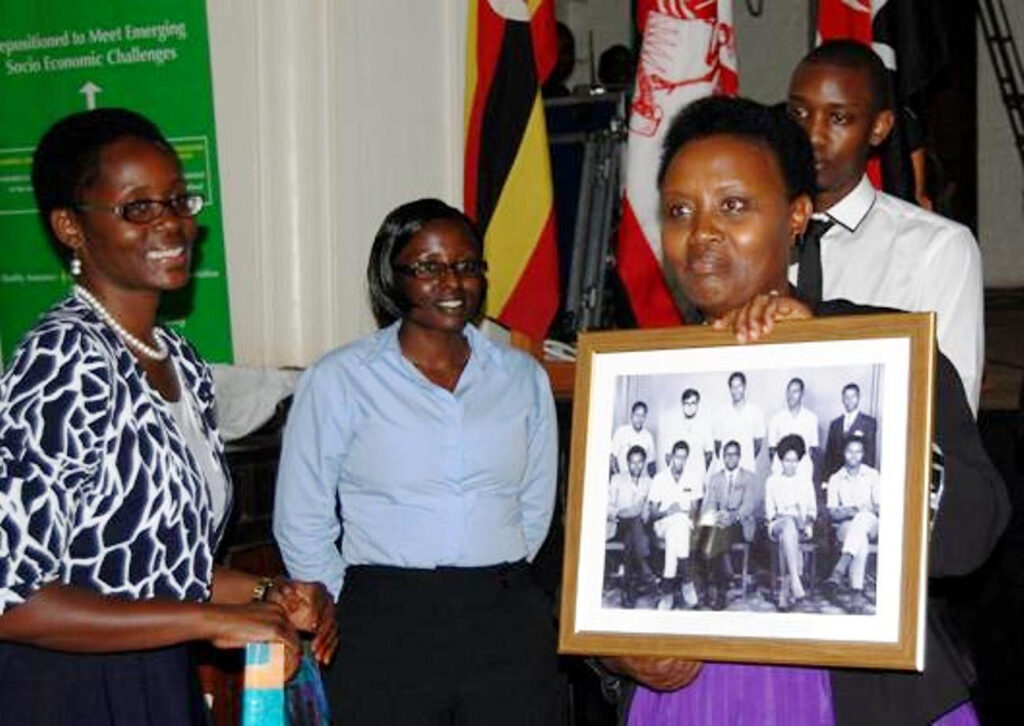
Prof. Peter Anyang’ Nyong’o said Joshua Baitwa Mugyenyi never gave up his disgust with the military regime. Although Joshua stayed at Makerere for some time as a tutorial fellow in the Department of Political science, continued as a Lecturer at the Institute of Public Administration, did his post graduate work in Manchester, came back as Senior Lecturer; his spirit was always urging him to do something about this military menace in Uganda. At the beginning of the eighties, after the debacle of the general elections of 1980, Joshua became a founder member of the Uganda Patriotic Movement (UPM) which eventually metamorphosed into the National Resistance Movement.
Professor Anyang’ Nyong’o informed the friends of Joshua gathered in the Main Hall that he had told the stories to describe the world Joshua lived in and the world he sought to change. “I have told these stories not to re-count the personal relations and experiences, but to shade light on the African world Joshua lived in and tried to change for the better; to get some insight into issues related to social transformation in contemporary Africa,” he stressed.
Joshua took theory to point of practice, and was always ready to engage in auto-criticism. “I remember in 1996, Joshua was very determined that the NRM should have a political transition in which the leaders of the NRM revolution would democratically pass the torch to a new generation so as to avoid tendencies towards authoritarianism,” Professor Anyang’ Nyong’o added.
Professor Anyang’ Nyong’o also observed that the challenges to democratic governance and social transformation in Africa remain pertinent today as they were then. But they cannot be known or practised without such piercing analyses and scholarship as was the case with Joshua. And scholarship, within and outside academic institutions, is always a social engagement. It is not confined to those of us who have degrees, it is the enterprise of those ready to think, write and speak on social issues without the cloud of dogma, bias and various forms of chauvisim.
Paying tribute to Joshua, Dr. Ezra Suruma, Senior Presidential Advisor on Finance and Economic Planning, said Joshua’s number one quality was courage. Dr Suruma was optimistic that if in every generation, we have one man or woman of Joshua’s intellect and courage, Uganda’s freedom would be fundamentally advanced. “As we remember Joshua, let us pray that God will raise men and women of his quantum of intellect and courage,” remarked Dr. Suruma who met Joshua in September 1979 at Makerere University and who together with Joshua agreed to form the Uganda National Movement (UNM). According to Dr. Suruma, Joshua’s life, his works and his example can be summarised as: “I will declare the truth. And I will fight for what is right, even though it is dangerous. And if die, I die.”
Mr. Fred Guweddeko, a researcher, at Makerere Institute of Social Research, informed the audience that Dr. Joshua Baitwa Mugyenyi had a dream to become the Vice Chancellor of Makerere University. Mr. Fred Guweddeko together with Dr. Joshua Baitwa Mugyenyi embarked on gathering data aimed at instituting reforms at Makerere when latter become the Vice Chancellor after Professor P.M.J. Ssebuwufu’s reign. Mr. Guweddeko said this is a dream he never lived to see.
Professor Mahmood Mamdani, a renowned scholar and Director of the Makerere Institute of Social Research (MISR), said the best of all independence is the independence of thought. He advocated for the need to turn Makerere into a research led university, and a purely public university not to benefit only the state, but society at large.
Dr. Joshua Baitwa Mugyenyi worked at the Bank of Uganda for 14 years. The Deputy Governor, Bank of Uganda, Dr. Louis Kasekende said many members of staff at the Bank of Uganda remember him for his open management style.
He initiated reforms aimed at improving the welfare of workers and respected all people regardless of their rank. “It was during his tenure that the Bank of Uganda launched the pension scheme. He revamped the training scheme, improved the appraisal system and initiated the House Advance and Building Loan scheme,” he said. “We in the Bank of Uganda feel proud to be associated with this noble cause of spearheading social transformation.”
Mrs. Mary Mugyenyi, the widow, thanked all the people who had filled the Main Hall to capacity for honouring their invitation. In a special way, she thanked the Makerere University Gender Mainstreaming Directorate, the Bank of Uganda and their consultant, Mr. George Piwang-Jalobo for the tremendous support towards the success of the public lecture and launch.On behalf of her siblings, one of the daughters of the late Joshua said that their father loved nature, loved children and he always brought joy, values that they will seek to emulate. “We shall be exemplary. We shall love each other. We shall always remember what our father stood for,” she said.
She said her husband was a family man, dedicated father and a person who encouraged free thinking in the family. She said that her husband encouraged and supported her to pursue her career and political aspirations.
“Today, 15th March 2012, marks the celebration of the past and also the launch of the future of Joshua immortalised through the- Dr. Joshua B. Mugyenyi Social Transformation Foundation. The best way to celebrate his life was to focus on his passion for education and knowledge. This Foundation will focus on the bright, but disadvantaged youth to access education,” she said.”The Makerere University Female Scholarship Foundation, which supports girls from disadvantaged socio-economic background, will be the first beneficiary of the Grant from the Dr. Joshua Baitwa Mugyenyi Foundation.”
Mrs. Mugyenyi added that the foundation will also support research and increase funding for the treatment of cancer and other non-communicable diseases.
Launching the Foundation, the Guest of Honour, Professor Apolo R. Nsibambi, former Prime Minister of the Republic of Uganda said: “I am honoured to launch the Dr. Joshua Baitwa Mugyeni Social Transformation Foundation to keep the memory of my student, colleague and friend alive. I pray that the Foundation will be blessed and prosper to advance the ideals, values and convictions for which Dr. Joshua Baitwa Mugyenyi lived and worked.”
Professor Apolo Nsibambi contributed Shs1 million towards the Dr. Joshua Baitwa Mugyenyi Social Transformation Foundation.
The Chancellor of Makerere University, Professor George Mondo Kagonyera, and also a very close friend of the Mugyenyi family thanked Mrs. Mary Mugyenyi for looking after the children and continuing to advance the principles that her husband, the late Dr. Joshua Baitwa Mugyenyi held dearly.
Written by: Ritah Namisango, Public Relations Office
You may like
-


Trees That Still Give Shade: Celebrating the Life and Impact of Prof. Tumusiime-Mutebile
-
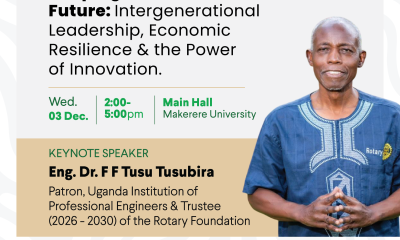

Illuminating Visionary Leadership: Introducing the Keynote Speaker for the 2025 Emmanuel Tumusime Mutebile Annual Public Lecture
-
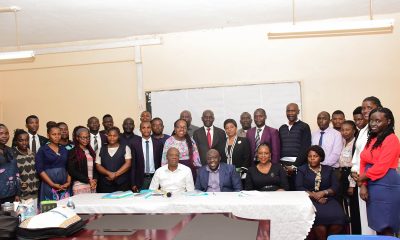

Mak staff and students tipped on Building Wealth, Securing the Future, Smart Investment and Retirement Strategies
-
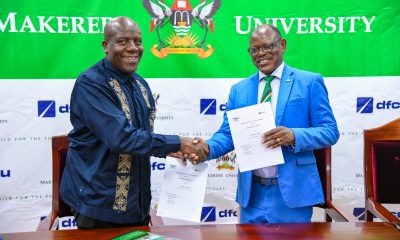

Press Release: Mak & DFCU Partner to Enhance Higher Education, Research & Student Support
-
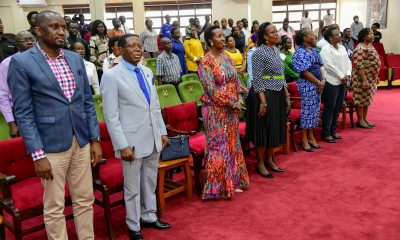

Leadership must be anchored in integrity-Mrs Kagina
-
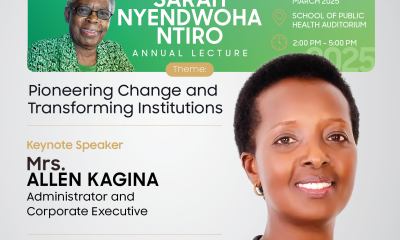

Announcing the 3rd Sarah Ntiro Memorial Lecture with Allen Kagina as the 2025 Distinguished Speaker
General
Makerere University commemorates 13 transformative years of partnership with Mastercard Foundation
Published
2 days agoon
March 2, 2026
On Friday, 27th February 2026, Makerere University proudly celebrated 13 years of a significant partnership with the Mastercard Foundation, a prestigious independent organisation headquartered in Toronto, Canada. Since its inception in 2013 with the launch of the Scholars Program-currently headed by Prof. Justine Namaalwa, this collaboration has grown significantly, expanding to include two additional initiatives: The E-learning Initiative-headed by Prof. Paul Muyinda Birevu and the Africa Climate Collaborative-headed by Prof. Gorretie Nabanoga. This long-term partnership underscores the shared commitment to fostering education, innovation, and sustainability in Uganda and across Africa.
The colourful event coincided with the 76th Graduation Ceremony, during which Makerere University honoured Ms. Reeta Roy, the Founding President and CEO of the Mastercard Foundation, with an honorary Doctor of Laws.

In her commencement speech, Ms. Roy thanked Makerere University for considering a partnership with the Mastercard Foundation and for conferring upon her a prestigious honorary award.
“Mastercard Foundation is honoured to collaborate with this esteemed university, and I appreciate the recognition through this award. I am excited to be associated with Makerere University and look forward to actively embodying its values. Joining the broader community of alumni from this distinguished institution is a privilege, and I am eager to contribute to its legacy,” stated Ms. Roy.

During the reception in honour of Ms. Roy, the Chairperson of Makerere University Council, Dr. Lorna Magara, acknowledged the invaluable support from the Mastercard Foundation. She emphasised the profound impact of the Foundation’s various initiatives, particularly the scholarships for disadvantaged youth, which enable them to access higher education and opportunities that might have otherwise been beyond their reach.
“On behalf of the Makerere University Council and the broader University community, I extend our sincere gratitude to Mastercard Foundation for its commitment to collaborating with Makerere University in various endeavours, especially for providing scholarships to our underprivileged young people who would never have stepped inside a lecture room at the University.” Dr. Magara stated.

Dr. Magara, in a special way, thanked Ms. Roy for her transformative leadership and unwavering commitment to supporting young people in Africa, citing her efforts to ensure young people get their voices heard.
“As a university, our business is with young people. We are therefore committed to providing the environment and education that deliver meaningful pathways. We will provide an environment that ensures young people have a voice and agency to create meaningful change in society.” Dr. Magara pledged.

Dr. Magara further congratulated Ms. Roy on her honorary Doctor of Laws from Makerere University, noting that it is the university’s highest honour for individuals who have excelled in their careers.
“On behalf of the Makerere University community, I would like to extend my heartfelt congratulations on your honorary Doctor of Laws. This esteemed recognition represents the highest honour our institution can bestow on individuals who have demonstrated exceptional achievement and excellence across various facets of their career.” Dr. Magara remarked.
Prof. Justine Namaalwa, the Program Director of the Mastercard Foundation Scholars Program and the Coordinator for all Mastercard Foundation Initiatives at Makerere University, expressed her appreciation for the thirteen-year collaboration between Makerere University and the Mastercard Foundation. She highlighted that the partnership had yielded significant, impactful results.

“In 2013, Makerere University partnered with the Mastercard Foundation to educate the next generation of transformative African leaders who can positively impact their lives, their communities, and the economies of Africa. The partnership has had a significant impact. I thank the University Management and the Foundation team for this visionary collaboration,” remarked Prof. Namaalwa.
Prof. Namaalwa articulated that the partnership with the Mastercard Foundation is primarily focused on empowering young people as agents of change for transformational leadership in Africa. She presented compelling statistics demonstrating the positive impact of the scholars’ program, highlighting the success of individuals who have completed their education and their subsequent professional experiences after university graduation.

“This partnership focuses on young people, aiming to create positive change in their lives. To date, the Scholars Program has graduated 974 alumni, with 48% securing formal employment, 18% starting their own businesses, 8% participating in internships, and 5% pursuing further education. Overall, 72% of Scholar alumni are actively engaged in employment or entrepreneurship,” Prof. Namaalwa stated.
The colourful event showcased a dynamic array of activities that highlighted the entrepreneurial spirit of Scholars and alumni from the Mastercard Foundation at Makerere University. Attendees enjoyed a mini-exhibition featuring innovative products from these ventures.

A video documentary illustrated the positive impact of the three Mastercard Foundation initiatives. The event also featured inspiring poetry recitations by Scholars and a lively atmosphere of music and dance, creating an engaging and memorable experience for all participants.
The high-level event was attended by senior University officials, led by the Chairperson of Council, Dr. Lorna Magara; the Vice-Chancellor, Prof. Barnabas Nawangwe; the Vice-Chancellor, Academic Affairs, Prof. Sarah Ssali, Deputy, and the Ag. Deputy Vice-Chancellor, Finance and Administration Prof. Winston Tumps Ireeta. Mr Yusuf Kiranda, the University Secretary; and Prof. Buyinza Mukadasi, the Academic Registrar, Chancellor Emeritus-Prof. Ezra Suruma, former Chairperson of the Steering Committee of Mastercard Foundation Scholars Program-Prof. Umar Kakumba, and the Deputy Executive Secretary, RUFORUM, and former Program Coordinator of the Scholars Program at Makerere University-Dr. Florence Nakayiwa, among many other officials graced the function.

The event was also graced by a high-level delegation from the Mastercard Foundation, led by Ms. Reeta Roy, the Founding President of the Foundation, and included the Mastercard Foundation Teams from the Country offices in Kigali, Nairobi, and Kampala; the Program partners; the Mentors, Scholars and alumni; as well as the Program staff of the three Mastercard Foundation Initiatives at Makerere University.
At the end of the event, Makerere University honoured Ms. Reeta Roy with University memorabilia, including a pencil-drawn portrait, a pencil-drawn photo of the Ivory Tower, and other Ugandan crafts. Ms. Roy cut a graduation cake together with the 10 graduates of the 76th graduation ceremony from the Mastercard Foundation Scholars Program.
Bernard Buteera is the Principal Public Relations Officer for the Mastercard Foundation Scholars Program at Makerere University.

It is with great pleasure that I welcome you to this edition of Mak News Magazine, a publication that continues to chronicle Makerere University’s journey as a centre of academic excellence, innovation, and societal transformation.
The stories featured in this issue vividly demonstrate Makerere’s unwavering commitment to addressing national, regional, and global challenges through research, partnerships, and people-centred solutions. They reflect a university that is deeply engaged with society, one that applies knowledge not only to advance scholarship, but also to improve lives.
A recurring theme in this edition is innovation for resilience and inclusion. From the College of Agricultural and Environmental Sciences’ Healthy Soy Initiative combating child malnutrition amid climate change, to the cutting-edge work of CEDAT’s Team Green Minds integrating IoT into agriculture, Makerere continues to harness science and technology to respond to pressing development needs. Equally inspiring is the College of Natural Sciences’ success in securing international funding to scale up fish processing technologies, with a deliberate focus on empowering women and strengthening livelihoods.
This issue also highlights Makerere’s growing role in advancing health and wellbeing. The launch of the Early Intervention Psychiatry Services Clinic at Makerere University Hospital marks an important step in strengthening mental health services, while the Hospital’s transformation from a modest sickbay into a centre of excellence stands as a testament to decades of strategic investment, dedication, and service to the nation.
Our commitment to education access and global engagement is equally evident. Strategic partnerships, such as that between the College of Education and External Studies and the Uganda Vocational and Technical Assessment Board, are expanding pathways to quality education. The establishment of the first-ever United States Studies Centre in the Great Lakes Region positions Makerere as a hub for dialogue, research, and policy engagement on global affairs. We also celebrate our vibrant international community, with graduates drawn from 67 nationalities—affirming Makerere’s status as a truly global university.
This edition further showcases initiatives that ensure long-term institutional sustainability, including the launch of the CoCIS Endowment Fund, infrastructure developments such as the modern hostel at Buyana Farm, and transformative programmes supported by the Mastercard Foundation that continue to empower young people across the continent.
As you read through these pages, I invite you to reflect on the collective effort of our students, staff, alumni, partners, and supporters whose contributions make these achievements possible. Together, we continue to shape Makerere University as a place where knowledge serves humanity.
I wish you an engaging and inspiring read.
Prof. Barnabas Nawangwe
VICE CHANCELLOR

The Board Chairperson of the Makerere University Endowment Fund (MakEF), Dr. Margaret Blick Kigozi, has urged graduands in Health and Life Sciences to uphold professional ethics and serve humanity with diligence and compassion.
Her appeal came during the passing out of graduates from the College of Natural Sciences (CoNAS), the College of Veterinary Medicine, Animal Resources and Bio-Security (CoVAB), the College of Health Sciences (CHS) and the School of Public Health (SPH) on Day Two of the 76th Graduation Ceremony of Makerere University.
“Class of 2026, you are now part of the Makerere legacy. Wherever you go clinics, laboratories, farms, boardrooms, or classrooms, you carry this institution with you. Serve your patients with skill and compassion. Care for animals and communities responsibly. Question boldly and keep learning,” Dr Kigozi, said.
Delivering the commencement address, Dr. Kigozi lauded the graduates for their dedication to careers that directly impact lives and communities. She encouraged them to use their knowledge generously and exercise their power gently.
“Your education has trained you to ask better questions. Your humanity must guide the answers. Never forget that behind every chart, every case, every animal, every experiment, there is life. And life deserves care, patience, and dignity. Give every person you come in contact with care, patience and dignity,” Dr Kigozi, noted.
As the graduates embark on their professional journeys, Dr. Kigozi emphasized the importance of cultivating basic business acumen and financial literacy to ensure sustainability in their work.

“You do not need to become accountants but you must be able to read the essentials: understand simple financial statements, budgets and key metrics so you can judge whether a clinic, lab, or program is sustainable. You are encouraged to start your business. There are numerous investment opportunities in your areas of training. You can provide services to our people and create jobs,” Dr Kigozi, said.
She shared candidly how, when she first stepped into leadership, she realised she did not understand balance sheets or budgets well enough. So, she returned to Makerere for short courses to strengthen herself.
“A well-run Hospital, clinic or lab delivers better outcomes, attracts staff, and secures funding. Business savvy is not only about profit, it’s about sustainability and the freedom to serve ethically and effectively. Carry clinical skill with business sense so your work endures and grows,” Dr. Kigozi, noted.
Quoting renowned writer and producer Shonda Rhimes, creator of Grey’s Anatomy, who once reflected that succeeding in one area of life can sometimes mean falling short in another, Dr. Kigozi encouraged women graduates to intentionally balance professional ambition with family responsibilities.
“When one area thrives, another is often under strain. When Navio was graduating from school I had to manage the Presidential Investor Round Table on the same day as Executive Director Uganda Investment Authority. I chose my job and delegated his siblings to attend Navios graduation. I learnt from this. I choose family always after that thing you achieve once and keep forever,” Dr Kigozi, said.
In his speech, the Prof Barnabas Nawangwe, the Vice Chancellor, informed the congregation that Makerere’s ranking on all university ranking platforms has remained stable, placing Makerere among the top 10 African universities and within the top 4.5% globally.
“In the Times Higher Education global ranking, Makerere University made a formidable jump from the 1200-1500 bracket to the 800-1000 bracket. This was no mean achievement and I congratulate all members of the Makerere Community on this stellar performance,” Prof Nawangwe, said.
Trending
-

 Humanities & Social Sciences1 week ago
Humanities & Social Sciences1 week agoMeet Najjuka Whitney, The Girl Who Missed Law and Found Her Voice
-

 General1 week ago
General1 week ago76th Graduation Highlights
-

 Health2 weeks ago
Health2 weeks agoUganda has until 2030 to end Open Defecation as Ntaro’s PhD Examines Kabale’s Progress
-

 Agriculture & Environment2 weeks ago
Agriculture & Environment2 weeks agoUganda Martyrs Namugongo Students Turn Organic Waste into Soap in an Innovative School Project on Sustainable Waste Management
-

 General2 weeks ago
General2 weeks agoMastercard Foundation Scholars embrace and honour their rich cultural diversity
